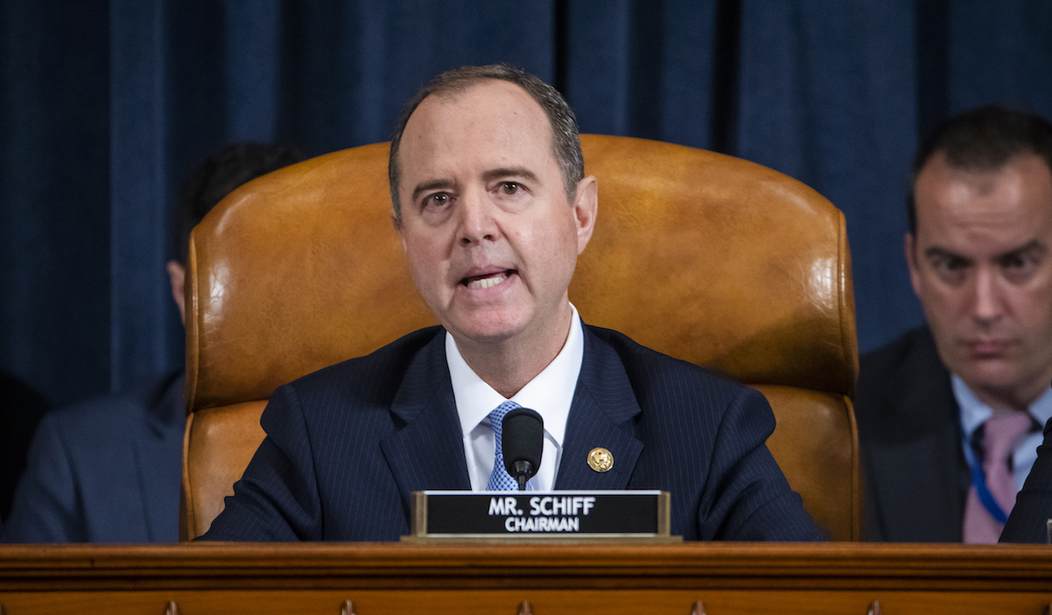"The Image: A Guide to Pseudo-Events in America" is the title of a 1960s book by historian and librarian of Congress Daniel Boorstin. Pseudo-events, he wrote, are staged solely to generate news media coverage. Real events involve independent actors and have unpredictable outcomes. Pseudo-events are shows.
It's not difficult to say which category the House Democrats' impeachment hearings belong in. It's a classic pseudo-event stage-managed to prod sympathetic media into running predictable stories. Inconvenient questions from Republican members are blocked, and the name of the original "whistleblower" is concealed, though the stage managers know who he is.
Yet on the front pages and cable news breaking-news bulletins, this pseudo-event is crowding out two genuine events of potentially world-shaking importance and uncertain outcome.
President Donald Trump is going to be impeached by the House and will not be removed from office by the Senate. But the potential for regime change -- or regime rigidification -- resulting from the prolonged rioting in Hong Kong and recent protests in Iran is hugely consequential and entirely unpredictable.
Foreign policy analysts classify nations as either upholders or disruptors of a world order. The disruptors in the years after World War I were Germany, Italy and Japan. The upholders failed to prevent them from triggering World War II. Since the end of the Cold War, the major disruptors have been China, Iran and Russia. Now the first two are facing vigorous protests and regime-change threats.
The nearly six months of protests in Hong Kong reflect a rejection of China's increasingly authoritarian state, which, armed with artificial intelligence facial-recognition technology, threatens an Orwellian eradication of freedoms.
Recommended
Will dictator-for-life Xi Jinping crack down violently in Hong Kong as Deng Xiaoping did in Tiananmen Square in 1989? Not clear. There would be costs internationally, but China is growing less dependent on exports to the U.S. and advanced countries. That's partly due to Trump's tariff threats but also to the fact that Chinese wages are no longer rock bottom and China's labor force is growing smaller.
So as China is disengaging from America, Xi may be willing to endure a backlash from a violent crackdown in Hong Kong. How does America deal with a more hostile and less economically connected -- and potentially much more disruptive -- China? Both houses of Congress passed unanimous resolutions backing protesters' demands, but beyond that it's not clear that anyone knows how to influence the regime's behavior.
On Iran, Trump and the Democrats have opposite positions. Former President Barack Obama signed a nuclear agreement with Iran that he hoped would lead to friendly cooperation in the Middle East -- hopes that were never fulfilled. Trump renounced the agreement and has squeezed the Iranian economy with results that may have sparked the current protests. They're serious enough for the mullah regime to have largely shut down Iran's isolated internet.
Will they lead to regime change? Iran's "green" protests in 2009, largely ignored by the Obama administration, didn't. These may not either. But history shows that peaceful protests can -- sometimes -- topple a tyrannical regime, even though it's hard to predict just when. Former President Ronald Reagan envisioned the fall of the Berlin Wall and former Sen. Daniel Patrick Moynihan the collapse of the Soviet Union, but neither knew those things would happen in November 1989 and December 1991, respectively.
It's possible that the regimes of post-Mao China and the mullahs' Iran might collapse after 40 years of tyranny. Or, less happily and more likely, these regimes may sweep aside the protests and last for centuries, like so many Chinese dynasties and Persian monarchies. Real events have uncertain and possibly momentous outcomes.
Not so with the impeachment hearings. Witnesses are heard complaining that Donald Trump subverted the "formal interagency policy process" and pressured -- "bribed" is the focus group-determined verb Democrats are now using -- Ukraine's government for political gain. But Ukraine is not a formal U.S. ally, and Barack Obama refused to even provide it defense weapons when Russia seized its territory in Donbas and Crimea. Now we're told that Trump should be ousted from office for a two-month delay in delivering the aid for those weapons.
"The executive power," Article II of the Constitution states, "shall be vested in a president of the United States of America," and Trump, as the career diplomats testifying have acknowledged, has no obligation to follow "interagency consensus." It's hard to avoid concluding that Democrats who detest Trump seized on this weak pretext for impeachment when the charges of Russian collusion they brandished for three years turned out to be baseless.
Polls show support for impeachment declining. Americans, it turns out, don't have to read Boorstin to recognize a pseudo-event when they see one.

























Join the conversation as a VIP Member